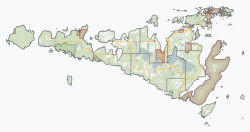Central Manitoulin is a township in the Canadian province of Ontario. It is located on Manitoulin Island and in Manitoulin District.
Central Manitoulin | |
|---|---|
| Municipality of Central Manitoulin | |
 Aerial view of Central Manitoulin with Providence Bay Beach in the foreground. | |
| Coordinates: 45°43′N 82°12′W / 45.717°N 82.200°W | |
| Country | Canada |
| Province | Ontario |
| District | Manitoulin |
| Government | |
| • Reeve | Richard Stephens |
| • Federal riding | Algoma—Manitoulin—Kapuskasing |
| • Prov. riding | Algoma—Manitoulin |
| Area | |
| • Land | 431.11 km2 (166.45 sq mi) |
| Population (2016)[1] | |
• Total | 2,084 |
| • Density | 4.8/km2 (12/sq mi) |
| Time zone | UTC-5 (EST) |
| • Summer (DST) | UTC-4 (EDT) |
| Postal Code FSA | P0P |
| Area code | 705 |
| Website | www |
Communities
editThe primary community and administrative centre of the township is Mindemoya. Smaller communities include Big Lake, Britainville, Dryden's Corner, Gibraltar, Grimsthorpe, Long Bay, Monument Corner, Old Spring Bay, Perivale, Providence Bay, Sandfield and Spring Bay.
Notable locations
editOntario has had a few historical claimants, by towns, for housing the province's smallest jail, the main three being: Tweed, Creemore and Coboconk. However, old jailhouses in Providence Bay, Port Dalhousie, Rodney, and ghost town Berens River have proven to be even smaller. The jailhouse in Providence Bay is now a cabin for tourists to stay at. Treasure Island, the largest island in a lake on an island in a lake, is located in Central Manitoulin, in Lake Mindemoya. The largest lake in a lake, Lake Manitou, is also mainly located in Central Manitoulin.
Demographics
editIn the 2021 Census of Population conducted by Statistics Canada, Central Manitoulin had a population of 2,235 living in 1,050 of its 1,603 total private dwellings, a change of 7.2% from its 2016 population of 2,084. With a land area of 427.61 km2 (165.10 sq mi), it had a population density of 5.2/km2 (13.5/sq mi) in 2021.[2]
| 2021 | 2016 | 2011 | |
|---|---|---|---|
| Population | 2,235 (+7.2% from 2016) | 2,084 (+6.4% from 2011) | 1,958 (+0.7% from 2006) |
| Land area | 427.61 km2 (165.10 sq mi) | 431.11 km2 (166.45 sq mi) | 431.53 km2 (166.61 sq mi) |
| Population density | 5.2/km2 (13/sq mi) | 4.8/km2 (12/sq mi) | 4.5/km2 (12/sq mi) |
| Median age | 58.4 (M: 58.4, F: 58.8) | 56.7 (M: 56.9, F: 56.5) | |
| Private dwellings | 1,603 (total) 1,050 (occupied) | 1,629 (total) | 1,541 (total) |
| Median household income | $70,000 | $59,328 |
| Year | Pop. | ±% |
|---|---|---|
| 2001 | 1,907 | — |
| 2006 | 1,944 | +1.9% |
| 2011 | 1,958 | +0.7% |
| 2016 | 2,084 | +6.4% |
| [8][9][1] | ||
See also
editReferences
edit- ^ a b c "Census Profile, 2016 Census: Central Manitoulin, Municipality". Statistics Canada. Retrieved June 20, 2019.
- ^ "Population and dwelling counts: Canada, provinces and territories, census divisions and census subdivisions (municipalities), Ontario". Statistics Canada. February 9, 2022. Retrieved March 31, 2022.
- ^ "2021 Community Profiles". 2021 Canadian census. Statistics Canada. February 4, 2022. Retrieved 2023-10-19.
- ^ "2016 Community Profiles". 2016 Canadian census. Statistics Canada. August 12, 2021. Retrieved 2019-06-20.
- ^ "2011 Community Profiles". 2011 Canadian census. Statistics Canada. March 21, 2019. Retrieved 2012-02-22.
- ^ "2006 Community Profiles". 2006 Canadian census. Statistics Canada. August 20, 2019.
- ^ "2001 Community Profiles". 2001 Canadian census. Statistics Canada. July 18, 2021.
- ^ Statistics Canada: 2001, 2006 census
- ^ "Central Manitoulin census profile". 2011 Census of population. Statistics Canada. Archived from the original on 2016-09-23. Retrieved 2012-02-22.

